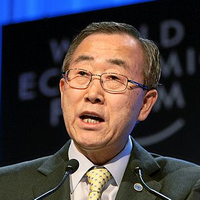When Ban Ki-moon was chosen as secretary-general of the United Nations, his predecessor Kofi Annan welcomed him as "a man with a truly global mind." Nearly five years on, such a mindset is indeed an asset, as Ban must find his attention constantly roaming from one to another of the planet's trouble spots.
In the past six months, the U.N. has played a central role in major crises in both Côte d'Ivoire and Libya. The Ivorian standoff threatened to shame both the secretary-general and the Security Council, as Laurent Gbagbo ignored their efforts to make him leave office after losing last year's presidential election. Yet, after months of wavering, the U.N. briefly but decisively threw its peacekeeping forces into the successful fight against Gbagbo in April, redeeming its credibility.
It remains unclear whether events in Libya will ultimately burnish or tarnish the U.N.'s reputation. Ban applauded the Security Council's decision to mandate the use of force against Libyan leader Moammar Gadhafi. Since then, he has been steadily supportive of NATO's operation -- a position that Annan implicitly criticized in a recent Financial Times interview. NATO's air campaign has also been subjected to hefty criticism by a politically significant minority of the council's members, including China, Russia and India.

